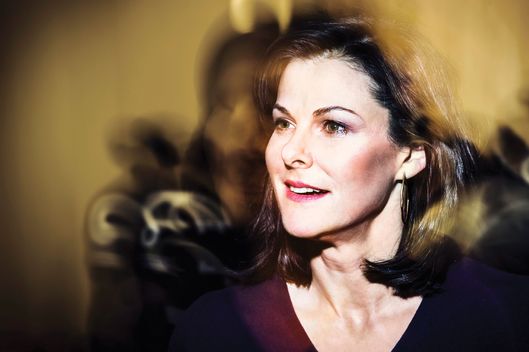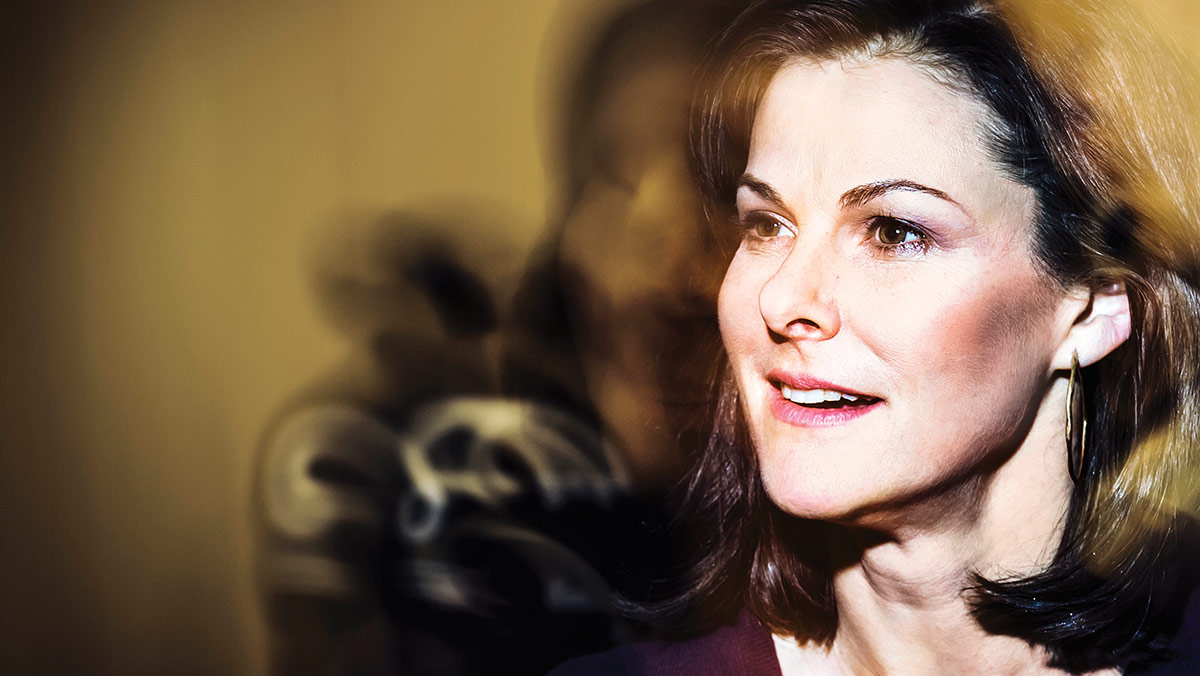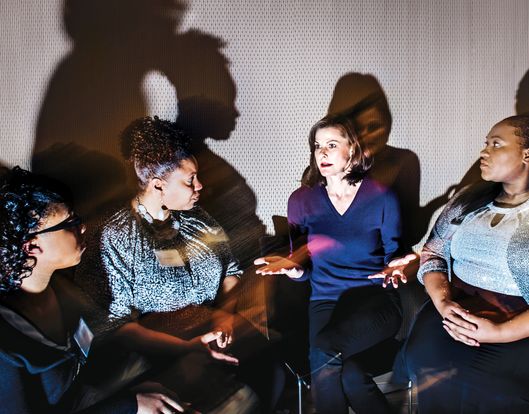How Campbell Brown Became the Most Controversial Woman in School Reform
She's managed to make a lot of enemies, thanks to her new mission.


“Don’t you love the energy here?” asks Campbell Brown, bouncing down the hall at the offices of “co-working” office-share WeWork. Forty-five and wearing a gray turtleneck sweater and mom jeans, Brown has small, curious brown eyes, a volleyball player’s carriage, and a deep voice that’s pleasant no matter what she’s saying. “You know, an Israeli guy [co-founder Adam Neumann] started WeWork with one office,” she says, swishing by row after row of glassed-in spaces for companies like Parking Panda, which helps find a spot for your car, and Unroll.Me, which has something to do with cleaning up a messy in-box. “And now it’s international and it’s huge!”
To be massive, shiny, and new—these are the libidinal values of tech. Here at WeWork, Brown is busy reinventing herself, too. Over the past few years, she’s transformed herself from a TV journalist to a hero reformer for the teacher-tenure-busting crowd, a spinoff of the charter-school-and-make-education-a-business crowd. We’re a couple of years past peak charter, when Waiting for “Superman” enraptured well-heeled do-gooders, Obama’s Education secretary dissed teachers unions, and school reformer and D.C. schools chancellor Michelle Rhee surpassed even Harlem Children’s Zone guru Geoffrey Canada as a neoliberal education legend. This past summer, Rhee stepped down from a nonprofit backed by the Bloomberg Foundation that had hoped to raise $1 billion, and a number of recent studies have shown mixed results for charters, which do not, generally speaking, outperform traditional public schools (though, as reformers point out, some especially good ones could be important laboratories). These days, the energy in reform is with those who are taking the fight to the courts. Mayors, chancellors, and the rest of the Albany Establishment are too entangled in political interests to make change, the activists claim, and education reform’s best chance is to bring lawsuits to challenge teacher tenure as unconstitutional.
Brown is their unlikely public face. Tenure, she says, violates students’ rights to an equal education, protecting bad teachers and preventing productive turnover. Enshrining that legal principle, of true equal opportunity for every student, would presumably require a much fuller and more radical transformation of the school system than the one reformers envision—or even really support. But anti-tenure litigants won their first suit in California this summer, and Brown plans to help file suits in two more states this year and ten in total over the next five years. Her first big day in New York court comes on January 14, when lawyers for her Partnership for Educational Justice will address the state’s motion to dismiss its suit. It’s unlikely her group will win, but the New York State chancellor has already announced plans to rethink tenure.
Even in school reform’s new lawsuit era, hand-to-hand combat is still the preferred mode of resolving—or not resolving—conflict. Brown has become the latest vilified figure in a decades-long PR battle—between the teachers union, one of the last powerful unions in the U.S., and “reformers”—to rival the ugliest type of corporate warfare. That battle can be high-minded; Randi Weingarten, the head of the American Federation of Teachers, says schools are doing fine: “New York’s graduation rates have increased by double digits since 2001, and New Yorkers still prize their public schools.” And the fight can be low-minded: The union has denigrated Brown as a patsy for her husband, and a pair of union-backed lobbying groups set up a website where she’s portrayed as a puppet being manipulated by two bankers with “1%” lapel pins. (Whether the union had anything to do with the site getting picked up by Twitter spambots seems an open question.)
“They say I don’t have standing to comment on schools because of my appearance and who I’m married to, and I say that’s just pathetic,” says Brown. “They don’t want to engage in a debate because they have no argument.” As for operatives who have said inflammatory things, such as that Brown’s tabloid-ready charge that unions are protecting sexual predators in the teacher corps was “equivalent to a blood libel”? She waves a hand. “I’ve covered the White House and been yelled at by presidents,” she says. “If people in power are pissed, it usually means you are doing something right.”

In person, Brown gives off a swashbuckling-belle vibe. She grew up in small-town Ferriday, Louisiana—where major events are celebrated “with a pig roast or crawfish boil”—but she’s a convert to Judaism, via her husband, Dan Senor, a high-caste neocon who was a spokesperson for Iraq’s transitional government and whose mother was a modern-Orthodox Jew. At WeWork, where she has accumulated a fair amount of office space for staff that she’s in the process of hiring, she talks about Shabbat dinners and sending her kids to a Jewish day school, and when I ask whether she bought a Christmas tree, she laughs and says, “No! I’m all in. I’m all in.”
School reform is a great issue for a maverick, which is how Brown thinks of herself at heart: southern and also a New Yorker; not a Republican, even though she’s married to one (she claims to be Independent, and has been registered with both parties); a feminist from her time in short pants who has written op-eds arguing that Planned Parenthood is self-destructive and that Barack Obama patronizes women (by praising them). “My mom was very much the product of a very paternalistic, deep-southern culture, but also a repressed feminist,” says Brown, whose father skedaddled early. “Her way of being defiant was to raise us to be rebellious ourselves—basically, the opposite of who she had to be in her own life. She said, ‘You are under no obligation to show respect for authority unless they’ve earned it.’ Now, as a guiding principle, that’ll land you in the principal’s office a lot. And thank God I found journalism, because it’s the one profession that rewards that.”
In Catholic school, Brown was a “terrible student,” she says, but the teachers there were awful, too. “My second-grade teacher went around the class and asked everybody what they were going to be when they grew up. I said, ‘I want to travel the world,’ and he said, ‘You’ll be married and pregnant by 21, just like all the girls in this room.’ ” At Virginia’s elite Madeira School, she was kicked out for sneaking off campus for a party. She earned a GED, and briefly attended LSU before waitressing in Colorado and enrolling in a Catholic college in Denver, where she met a political-philosophy instructor and priest who “changed my life, without question. Everything suddenly made sense.”
A personal story about special teachers is a common yarn from school reformers, though opponents tend to argue it’s the circumstances that surround the conversion (family background, wealth, community values) that play a bigger role. Brown moved to Prague to teach English soon after the Berlin Wall came down—there, she got a tattoo of Andy Warhol’s banana as an homage to the Velvet Revolution by way of an homage to the Velvet Underground—and then, in the U.S., interned at a TV news channel in Virginia. Soon, she landed in Topeka, Kansas, as an on-air correspondent for $6 an hour. “Someone once told me I looked good in red, so I bought every piece of clothing in red and bright-red lipstick. I had huge hair, as big as I could tease it and spray it.”
Brown eventually spent three years as a White House correspondent, but stopped loving journalism after becoming an NBC Today, Weekend Edition co-anchor in 2003. “Suddenly I had to care about ratings, whereas when I was a reporter, ratings were Tom Brokaw’s problem.” When she moved to CNN as a host in 2007, she had two kids in quick succession and moderated one of Hillary Clinton and Barack Obama’s presidential-candidate debates (before, she crouched in a closet pumping breast milk), but was also forced to cover the death of Michael Jackson and the crackup of Britney Spears. “I went from doing something that I felt was important and meaningful in the world to something that made me feel like I could be contributing to the problem, which is where cable news went, I think.”
When she resigned, Brown’s ratings at CNN were half of Keith Olbermann’s at MSNBC and a sliver of Bill O’Reilly’s. But leaving the anchor’s desk and returning to the field didn’t seem plausible, either. “The job that I had, as a political journalist, does not exist anymore. The news business has changed entirely. Of course, no one in news has the same level of access, because why would they give us access? They don’t need us anymore. If I were advising a presidential candidate for this cycle, I’d tell them not to do any major interviews with broadcast TV or major TV. Live-stream your events. Do friendly interviews and put them out on your own, and if that’s the only material that the networks or cable channels have, they’ll run it.” She continues, “During the Ferguson riots, I was lying in bed with my husband and we’re live-streaming the local station on our computer and we’re on Twitter, that’s how we’re watching it. I said, ‘Can you believe the TV’s not on right now?’ It’s amazing.”
I suggest she could put together a new show, on education. “Good luck selling that,” she says, guffawing. “Pitch the networks and see how far you get. Public access. Maybe.”
Is Brown a true believer or an opportunist hunting for a second act? All I know is she fact-and-figured me unbelievably hard during a two-hour off-the-record coffee earlier this winter and, in our on-the-record interviews, interrupted often to unfurl a study, adding “Now this is going to get a little wonky, but stay with me.” She’s adamant that teacher quality is the No. 1 “school-based” factor in determining a child’s success and that axing ineffective ones will have huge dividends for students, especially those living in poverty (though she acknowledges the consensus wisdom that making people less poor would have an even bigger effect on student performance).
Head-spinning data sets are the fluttering fans of both sides in the school-reform debate, concealing ideological motivation of the game’s players and the overwhelming complexity of measuring student performance, but plenty of experts disagree about how important teacher tenure really is. “Most people agree that Campbell Brown has identified an important problem: Poor kids are stuck with the worst teachers. But her approach of attacking tenure is barking up the wrong tree,” says Richard Kahlenberg, an author and senior fellow at the progressive Century Foundation, adding that polling shows tenure is so important to teachers you’d have to increase their salaries by half to make up for taking it away. (Weingarten, sworn enemy of Brown, points out that the states that have the best protections for teachers also have the best academic performance.) Low-income minority students have the weakest teachers because of economic segregation, Kahlenberg says, which suggests the solution is mixing and matching low- and middle-income kids in individual schools (something, one imagines, that would cause an uproar in nice neighborhoods already endowed with good schools). “On the tactics, I have to give Campbell enormous credit,” Kahlenberg continues. “She’s taken what most educators believe is a peripheral issue and elevated it to the cover of Time magazine. So even if she loses her lawsuits, she’s changed the public conversation—in my view, in a negative way. But I think she’s highly effective.”
Brown becomes exercised at the suggestion that tenure is a peripheral issue. “I don’t think a single parent at P.S. 101 in Queens, a middle-class school where there was a physical and verbally abusive teacher, thinks this is a peripheral issue,” she says. She relishes the details that she knows are good for news, like the story of a teacher who suggested to a student she could be his “little sex slave” and could give him a “striptease” and still wasn’t fired (though he was suspended and retired shortly thereafter). There are, of course, outrageous cases. But at its core Brown’s crusade is less about disciplinary procedure (which she wants to take out of the hands of arbitrators whom the unions help choose) and more about those teachers whose students underperform on tests. As to what should be done about them, Brown insists she wants only incremental changes: Instead of being granted tenure in three years, as is the case in New York State now, she’d like it to happen after five years, and only if a teacher performs well, as well as an agreement that a teacher can lose tenure if he or she has two “ineffective” ratings (which does sound a bit like the meaningful end of tenure).
This technocratic rhetoric may sound familiar in a corporatist Big Data era, but there’s an emotional side to this too: Reformers like Brown believe the union is ghoulishly acting in its own self-interest by putting the need for middle-class, stable, tenured jobs over the needs of disadvantaged children. Union allies agree that class warfare is at play, but point fingers at rich reformers telling middle-class teachers how to do their jobs in schools where they don’t send their kids. Brown’s lawyers are working pro bono, but her donors include the Walton family and the Broad family (she’s also put in more than $200,000 herself, saying, “It’s easier to ask when you’ve given too.”). And she’s worried about being painted as the wealthy Tribeca mom that she is—I tried to make small talk with her, mentioning Telluride and SoulCycle, but she didn’t take the bait, shooting a look at me that said, “I know what you’re doing, babe.”
New York City elites, particularly hedge-fundees from both the right and the left, have developed a taste for this type of philanthropy, perhaps from living in a city where the only topic more horrifying than the real-estate market is the schools, and Brown hopes to come across as a less-conservative pitchman for reform, to quell fears that this is all a Trojan horse for the privatization of education. Despite the investment of the Waltons and others, she says, “This is not partisan. This is not a Democrat vs. Republican battle for me.” She calls the mismatch between attacking a strong union in a time of vast income inequality a “key dichotomy” in this debate and says she knows she has to address it. At the same time, when asked if she would send her kids to public school, she says probably no—but she would send them to one of Eva Moskowitz’s Success Academy charters, she says, where she is on the board.
On a recent afternoon in Harlem, she hosted some of the plaintiffs from her case—technically, the lawsuit is being brought by ten families with children who they believe are underserved by New York schools—and Howard Fuller, the controversial Marquette charter-school guru. It was a nice gathering, with a lot of talk about civil rights, Ferguson, and how “knowledge has no racial aspect—it just wants to be known.” But there were mentions of the need to commit to the fight, even comparisons to storming the Bastille. “There will be people who are going to come out against you in very treacherous ways,” said Fuller to the families and their kids. Brown nodded. “There’s a monopoly controlling public education in this country, and they’re not going to give you the keys to the car,” she had said earlier, sounding less like a meliorist than someone plotting a velvety hostile takeover. “This is a political fight, and political fights can be very intense,” she warned. “But every important fight in our history has been won and lost on a political battlefield, so you can’t shy away from it.” Later, she said. “I really do care about these kids, and they’re the ones I’m focused on. These parents are really the ones who are brave here.” And she knows she’ll be fine. “At the end of the day, I have my friends to go to Shabbat dinner with.”
*This article appears in the January 12, 2015 issue of New York Magazine.